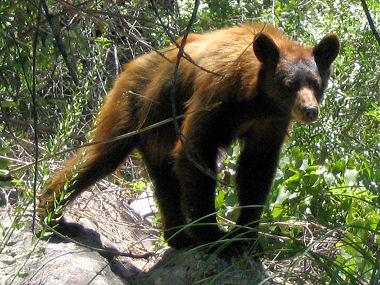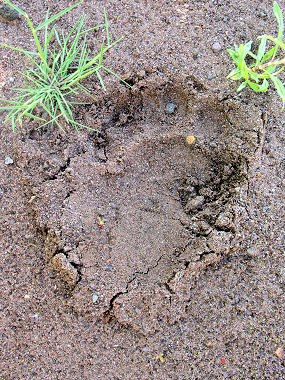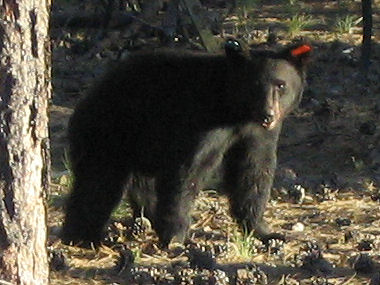Though the name implies a dark
coloration, the black bear can also have a blond, reddish ("cinnamon"),
or brown coat. One of the larger mammals in Arizona ,black bears can be
up to three feet tall at the shoulder and weigh up to 400 pounds. Black
bears are shy, secretive animals possessing considerable curiosity and
displaying high levels of intelligence and exploratory behavior. Black bears are generally active in the early morning and late
evening. They are normally solitary animals, except for family groups
(mother and cubs), breeding pairs, and congregations at feeding sites.
Though their eyesight is poor they are good climbers and swimmers, can
run at up to 30 mph and have a keen sense of smell.
behavior. Black bears are generally active in the early morning and late
evening. They are normally solitary animals, except for family groups
(mother and cubs), breeding pairs, and congregations at feeding sites.
Though their eyesight is poor they are good climbers and swimmers, can
run at up to 30 mph and have a keen sense of smell.
|
Do a web search for black bears
and you'll find lots of hunting related information, an activity I
will never understand. Why would anyone want to kill 'Teddy'? Real
tough guys don't carry guns, they carry cheap point and shoot
digital cameras and get close up photos like the one at right. Or
maybe that's just what dumb guys do. |
Black bears are the most common and widely distributed
of the three North American bears. Historically, black bears occurred in
all forested habitats in North America, including Mexico. The species
has been extirpated (a nice way of saying that humans killed every last
one) from many eastern and mid-western states, but still occurs in 38
states, 11 Canadian provinces, and seven Mexican states. In Arizona,
black bears are found in chaparral, pine, and aspen-fir forested areas
throughout the state (except north of the Colorado River) at elevations
ranging from 4,000 to 10,000 feet. Being omnivores, black bears feed on
both plants and animals. The bulk of their diet consists of berries,
roots, grass, cactus fruits, insects, and occasionally small mammals or
carcasses. Black bears breed in July. Cubs are born during January in
winter dens, usually in pairs. The cubs are very small and helpless at
birth. Cubs emerge from the den in April and stay with their mother
through the first summer and fall, denning with her their second winter.
Female black bears in Arizona usually reach reproductive age in their
fourth year, and usually breed every other year. Black bears live about
15 years.
Tips for hiking in bear country:
-
Don't approach bears, no matter how 'tame' they
seem!
-
Protect your food around camp, don't give the
bears an excuse to come around.
-
A bear will attack if they’re surprised, feel
in danger, are protecting territory or cubs. The best way to avoid
trouble is to avoid the bear.
-
As you hike through bear territory, and can’t
see more than 50 to 100 feet in front of you, make some noise:
Some people whistle or sing; others use “bear bells.”
-
If you encounter a bear, don't panic! Make sure
it sees you, and talk to it. Hold your arms high above your head.
(This makes you look deceptively larger.) Continue talking, and
slowly back away. Don’t turn and run or the chase will be on!
-
If the bear charges, drop to a fetal position.
Cover your head and neck with your hands. (Your pack may help
protect your back.) Even if the bear bites, play dead: The bear
may lose interest and leave. However, if the attack continues,
fight back, yelling and screaming as loudly as you can.
 |

